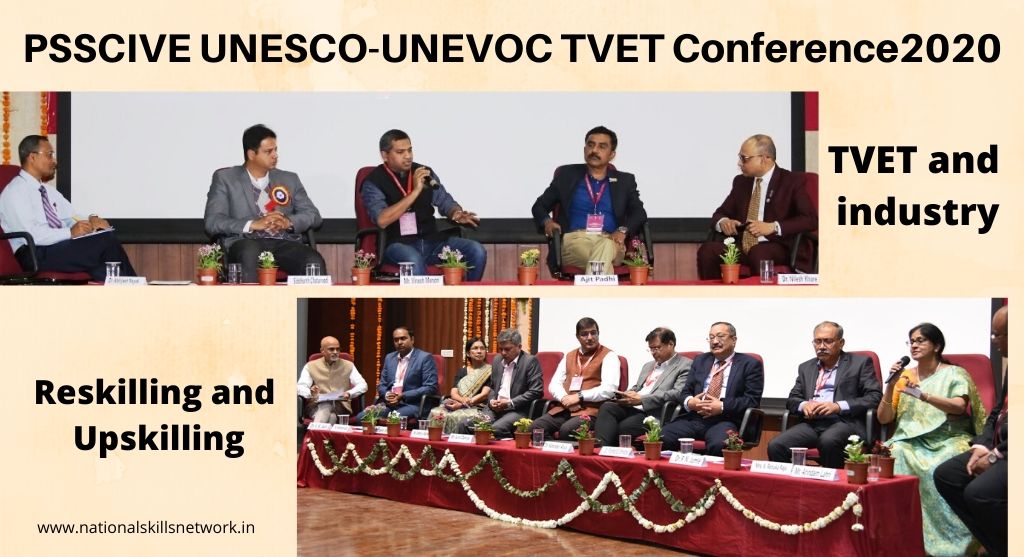The two-day National Conference by Pandit Sundarlal Sharma Central Institute of Vocational Education (PSSCIVE) on Reimagining TVET for the Changing World, was attended by many stakeholders in the skilling and vocational education space. The panelists and the presenters represented various Ministries, researchers, academic professionals, representatives and experts from various Sector Skill Councils, national and international organizations, teachers, vocational trainers among others.
In this article, the Team NSN presents you with some of the major points highlighted by the industry experts at the conference.
Dr. Pramod B Shrestha, Professor, Institute of Engineering Tribhuvan University, Kathmandu, Nepal
On a philosophical note, there is a need to connect learning with living. The four important elements in the evolution of learning and its association with livelihood enablement includes teaching, learning, earning and living. To quote from the teachings of the Buddha and Socrates, we can imbibe the three Cs of Content, Context, and Community (Sangha).
Content has at its core knowledge and skills. Context makes learning suitable and since it has to be applied in a context. Community adds the element of learning through networking. To be successful it is important to have pride and passion.
Siddharth Chaturvedi, Director, AISECT
There could be incentivization of industry in the reskilling of employees through subsidy or cess and it has to be decided by the government by taking a cue from the model in the UK and Germany. The NASSCOM PRIME scheme is a good example of how skilling can happen in the IT sector to overcome mindset issues and address the needs of underprepared teachers. With the growth of the online learning industry, 40% of reskilling and certification takes place in a blended format. Learning should not be constrained in the classroom; flexibility and great content can motivate many to learn. The government moves to accord credits for online learning should go up from 20% to 40% to make it a key differentiator.
Basab Banerjee, International Vocational Skills and Recruitment Specialist, SkilIndiGlo, Noida
For 60% of their talent requirements, many countries in the world have to depend on India. To realize this opportunity, we need to think globally and meet international standards in skilling. Hence, TVET has to meet the standards set by other countries and by clearing the specific certification. There is an urgent need to map competencies and fill the skill gaps to meet the quality of overseas employment.
 Vinesh Menon, CEO, Vibgyor Group of Schools
Vinesh Menon, CEO, Vibgyor Group of Schools
There is a need to have seamless integration between the Ministry of Skill Development and the Ministry of HRD. Though MHRD has advocated experiential learning and the new education policy has many innovative elements, we need to have new courses like Digital Marketing being taught in schools. The trades listed in NSQF have to be updated and made relevant to the needs of evolving technology like Artificial Intelligence, IoT and others.
Dr. Satender Arya, CEO, Agriculture Sector Council
Sector Skill Councils (SSCs) are in various stages of evolution and they play an important role in industry-driven curriculum development. SSCs are also striving to facilitate apprenticeship adoption in the industry. Agriculture being the largest employer in the country needs many skilled people and the mindset has to change. It is no longer a job for the unskilled or semi-skilled workforce. Along with Fisheries, Dairy and Horticulture, agriculture also needs people with formal training and education and with new competencies. This could be associated with new technologies from Industry 4.0 and low-cost farm mechanization.
James Raphael, Executive Head, Retailers Association’s Skill Council of India
The retail sector is the second-largest employer, with over 10 million retailers in India, the complexity of the country needs many long term interventions and these initiatives cannot have overnight results. Hence, we need to understand that it is a process and it will take longer. Since retail has evolved as omnichannel, it has huge potential to create jobs and embrace Industry 4.0. Besides training thousands through PMKVY and other schemes in job roles like Retail Sales Associate, RASCI has also embarked on collaborating for 3-Year Degree courses through industry partnerships for curriculum design and practical training that lead to a supervisory job. Now launched in three colleges, this will be scaled to 500 colleges in the next few years and it will have counseling sessions for students and parents about education that links with employment.
Arindam Lahiri, CEO, Automotive Skills Development Council
The automotive sector is the largest employer in the manufacturing sector and contributes to 50% of manufacturing GDP. Though the last 18 months have been difficult due to prevailing market conditions, the industry is getting disrupted through green, renewable and sustainable technologies. TVET at school level will transform radically since most manual jobs like technicians and others are getting automated and today a mechanic’s job does not mean getting hands dirtied under the bonnet of a car but maintaining it through a computer or a mobile app. ASDC is also digitizing the assessment process by including practical assessments and strengthening the infrastructure for training through simulators and extended reality.
Dr. P. N. Jumle, Director, Board of Apprenticeship Training (BOAT)
Board of Apprenticeship Training (BOAT) has been promoting apprenticeships among medium and small enterprises and sensitizing the industry about the benefits of apprenticeships. Today, there’s an opportunity to engage fresher apprentices who could be non-graduates. We need to create more awareness about how apprenticeships are crucial to career development by getting an entry into the world of work and promoting win-win interaction between the industry and academia.













Please update the news and program. Also we would like associate with your program